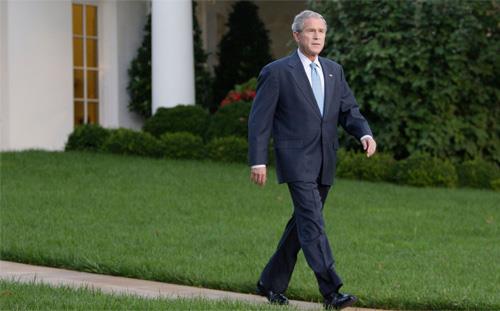
You might think the presidency of George W. Bush would look markedly different now that we’ve had three-plus years of a very different Republican president, Donald Trump.
PBS’s new two-part, four-hour American Experience documentary George W. Bush, which runs Monday and Tuesday, 9-11 p.m. ET (check local listings), suggests it doesn’t.
The second President Bush still comes off as a perfect candidate for president of his college fraternity and less likely as president of, say, the United States.
George W. Bush works hard not to make its own judgment on whether Bush’s eight years in office were a success or a failure. Many of its commentators served in Bush’s administration and spoke positively in the film of what he did.
Among the usual gang of historians, there are few broad judgments. They focus more on the context of individual actions, explaining the factors that seem to have influenced him at the time.
That said, George W. Bush ends up spending much of its time on the three defining events of his years in office: 9/11 and the subsequent decision to go to war in Afghanistan and Iraq; Hurricane Katrina and its aftermath; and the financial crisis of 2008.
It’s hard to take victory laps from any of those three, and Bush is seen toward the end of the documentary tacitly admitting as much.
Things did not, he says, always turn out “as we might have hoped.”
None of these three moments was without nuance. In the wake of the 9/11 attack, Bush positioned himself as the resolute leader America wanted, vowing to track down terrorist leader Osama Bin Laden and bring him to justice.
That resolution led him to focus on removing the Afghan Taliban government said to be sheltering Bin Laden – and then, a short time later, invading Iraq to topple Saddam Hussein. While it has been widely reported that Vice President Dick Cheney was the main uber-hawk who convinced Bush these were the only courses, this documentary suggests Bush himself already held the same view.
One administration official recalls that when State Department leaders tried to convince Bush to give diplomacy another shot before invading Iraq, Bush brushed them off with an expletive.
Ironically, this American Experience says, Bush’s one caveat was that this invasion not lead to another Vietnam, an endless battle with no victory in sight.
Buoyed by tenuous progress in the Afghani mission, Cheney and others reassured Bush that crushing Saddam would be quick and easy.
We’re still sorting out the consequences of that miscalculation.
Bush’s Katrina response is portrayed here as simply late and indifferent. The documentary gives him higher marks for his response to the 2008 fiscal crisis, noting that he reluctantly abandoned his free-market instincts to embrace a massive bailout package for financial institutions.
He did that, several commentators suggest, with an eye on his legacy. He wanted history to see him more as FDR than Herbert Hoover.
These three issues, and the presidential elections of 2000 and 2004, take up almost all of George W. Bush’s four hours. It adds up to a lot of political science, which leaves little room for anything on the human side.
And this leaves the unspoken possibility that, frankly, there isn’t a lot to explore there.
It’s been well documented that right through his 30s, Bush was a well-bred, well-connected, good-time drifter, as interested in a frat party as he was in political parties.
His family pushed him into an epiphany around the time he turned 40, and it turned out his skillset translated beautifully to politics. Within a few years he was governor of Texas, then president of America.
While he had some intelligence, there’s little suggestion here that he was a genius. He came from a long line of Republicans and essentially adapted their philosophies, though he pointedly disregarded his father’s advice when he plowed forward with the Iraqi war.
There’s some suggestion here that, as his critics long asserted, he was heavily influenced by the more ideologically driven aides around him, like Cheney, Paul Wolfowitz, and Donald Rumsfeld.
The final scene of George W. Bush has him walking out of the Oval Office on the morning of Barack Obama’s inauguration and not looking back. The implication is that he was leaving assessment and analysis to others, and we see that process continuing, somewhat cautiously, with documentaries like this.